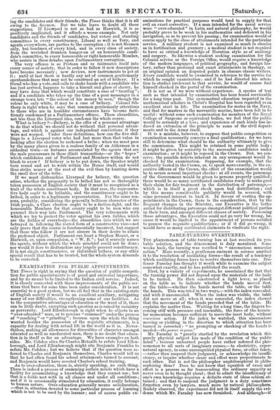EXAMINATION FOR PUBLIC APPOINTMENTS.
Tire Times is right in saying that the question of public competi- tion for public appointments is of great and universal importance, and by no means to be limited to the Indian civil service. Indeed, it is closely connected with those improvements of the public ser- vices that have for some time been under consideration. It is not essential to a good system, but we all feel that in the existing state of English society it would be an excellent auxiliary, mitigating many of our difficulties, strengthening some of our facilities. As to the comparative advantages of education or the want of it, there can be little doubt, excepting such question as is raised by casuistry or perversity. Lord Ellenborough is right when he objects to an " over-educated " man, or to persons "crammed" under the process of "coaching" or "grinding" ; because upon the whole the thing wanted besides the possession of the requisite attainments, is a capacity for dealing with actual life in the world as it is. Never- theless, making all allowances for diversities of character amongst educated as well as uneducated men, there is no doubt that educa- tion is in itself so far an advantage. We have examples on both sides. Mr. Cobden cites Sir Charles Metcalfe to refute Lord Ellen- borough, and Lord Ellenborough might cite Benjamin Franklin to refute Mr. Cobden ; but we believe that if the question were re- ferred to Charles and Benjamin themselves, Charles would tell us that he had often found his school attainments turned to account, and Benjamin would have coveted Charles's school training. As to over-education, there is, strictly speaking, no such thing. There is indeed a process of cramming certain minds which have a facility for accumulating a knowledge that they cannot use ; but that is a foible met with in all classes and under all conditions ; and if it is occasionally stimulated by education, it really belongs to human nature. Over-education generally means mileducation, —that is, attention devoted to some particular process of learning which is not to be used by the learner ; and of course public ex-
aminations for practical purposes would tend to supply for that evil an exact corrective. If a man intended for the naval service were " over-educated" in Latin and natural philosophy, he would probably prove to be weak in his mathematics and deficient in his navigation, so as to prevent his passing ; for examination would of course apply to the class of attainments intended for the particular service. A military student is not examined so much in classics as in fortification and gunnery ; a medical student is not required to have so critical a knowledge of Horatian style as of anatomy and surgery. So likewise a student seeking examination for the Colonial service or the Foreign Office, would require a knowledge of the modern languages, of political geography, and foreign his- tory, rather than profound and exact attainments in theology, or an original opinion on disputed points in obscure classic writers. Every candidate would be examined in reference to the service for which he sought examination ; and if he had directed his atten- tion to studies irrelevant to that service, he would of course find himself checked in the portal of the examination. It is not as if we were without experience. A species of test such as that intended by examination has been found serviceable for a long time past. The systematical education imparted to the mathematical scholars in Christ's Hospital has been regarded as an excellent start in life. The examination for mates in the Navy, and that for masters in the mercantile marine, have been felt to be useful : without some such examination for members of the Royal College of Surgeons or equivalent bodies, we feel that the public would be seriously at a loss ; and experience of such kinds has in- duced an extension of the principle to some of the civil depart- ments and to the Army itself.
It is a mistake, however, to suppose that public competition or examination necessarily conveys a final qualification ; for we have still to determine what should be the authority ultimately to give the commission. This might be retained in some public body ; it might be given by seniority to the successful candidates under examination ; or it might be reposed in the Crown. But we con- ceive, the possible defects inherent in any arrangement would be checked by the examination. Supposing, for example, that the authority vested in the Crown, or, to speak more exactly, in the ex- ecutive officers of the Crown, the effect of the examination would be to secure several important checks : at all events, the patronage of the Government would be given to persons properly qualified ; there would be so many certificated candidates ready to make good their claim for fair treatment in the distribution of patronage,— which is in itself a great check upon bad distribution ; and by this means considerable publicity would be secured, with some personal interest to back it. In favour of vesting the ap- pointments in the Crown, there is the consideration, that by the frequent changes in the Ministry, our Executive is the better suited for distributing patronage amongst different political parties in their turn, and amongst different classes of society. Possessing those advantages, the Executive could not go very far wrong, be- cause it would be limited to the appointment of persons certified to possess the requisite qualifications ; or if it did go wrong, it would have so many certificated claimants to vindicate the right.


























 Previous page
Previous page